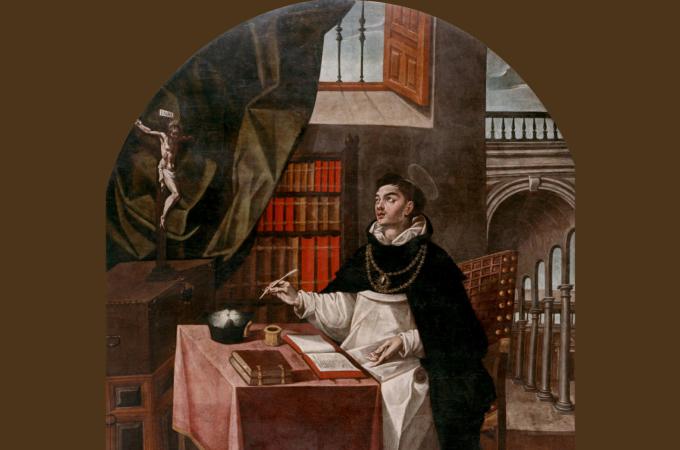What would Aquinas do?
January is a great month for Catholic feasts. It begins with the Solemnity of Mary the Mother of God. Then, there is the Holy Name of Jesus and the Epiphany. For Americans, the month contains three blockbuster saints' days -- St. Elizabeth Ann Seton (Jan. 4), St. John Neumann (Jan. 5), and the heroic nun who helped Father Damien with the lepers of Molokai, St. Marianne Cope (Jan. 23).
And then there are many of us who look forward with great devotion to the feast of St. Thomas Aquinas (Jan. 28).
Nothing written by man is as consistently insightful, reliable, balanced, and lucid as the "Summa Theologiae." That's the correct title of the work-- in English, "a summary of theology." People used to say "Summa Theologica," or "theological summary." Strangely, the incorrect title is more appropriate. To study and master the "Summa" is to acquire a comprehensive grasp, not simply of theology in the Church as received up to the 13th century, but also Greek and Roman philosophy, culture, letters, and law. It is a summary, from a theological perspective, of Western civilization.
It would be a fine goal for a good college student to want to learn Greek to read Homer and the New Testament in the original, and Latin to read St. Thomas -- and, as the Latin is simple, one intensive year of study is enough.
People sense correctly that, as the transition from classical to Christian civilization had its guiding master, St. Augustine, and the transition from the medieval to modern world had St. Thomas as a source and foundation, today we need someone who can play a similar role. And thus the question, what would an Aquinas today look like?
The question is typically posed in too narrow a way. Aquinas wrote during a period when Aristotle's writings were being recovered. Aristotle was taken to be "The Philosopher" pre-eminently. Aquinas, as it were, "baptized" Aristotle, people say, by integrating Aristotle's thought with Christian revelation. Therefore, an Aquinas of today would start with some comprehensive philosopher in the modern age -- whomever one takes to be the most authoritative while suitably friendly to Christian doctrines, say perhaps, Kant, Heidegger or Husserl -- and in a similar way try to integrate this philosophy into Christian thought, or, even, restate Christianity in a form matched to this philosophy.
However, this approach is too narrow, because Aquinas did not view Aristotle as the most comprehensive, authoritative, and "friendly" philosopher, but rather as someone who gave the best statement of the truth about the knowable world. For Aquinas, the term "philosopher" did not mean what we mean. It did not mean someone who studies a particular discipline having a distinctive method (introspection, language analysis, logical analysis, transcendental deduction), but rather someone who studies the world, admittedly tracing what is in the world back to first principles and up to highest causes. Until recently, scientists were called "natural philosophers."
Also, this approach supposes that the question "what would Aquinas do" should be answered by similarity rather than analogy. What do I mean by this contrast? There are two types of imitation. By the first, we try to make ourselves similar to someone. For example, a student may imitate his teacher by holding similar views and adopting similar mannerisms. By the second, we try to do what is analogous, given the changed circumstances. So, if a teacher effected a revolution in his discipline, the student tries to do something analogous, likewise effecting a revolution -- but in this case to do so means precisely overturning, not copying, the ideas of his teacher! Similarly, someone would imitate Jesus by similarity if he gave up all his possessions, wore a simple cloak and sandals, and wandered from town to town preaching -- like St. Francis of Assisi. Someone would do so by analogy if, for example, he considered how he could best reveal God to his neighbor in his work as an investment banker on Wall Street.
Fortunately, the religious order which Aquinas belonged to still exists and continues in pretty much the same way of life. So, it is easy to see what imitating Aquinas by similarity would most strictly amount to become a Dominican, master the thought of St. Thomas, and acquire his mind (be a "Thomist"). Contemplating those truths, one then brings those truths to others.
Let me be clear: this is an extremely valuable way to imitate St. Thomas. We need more Thomists like this, not fewer -- many more. In recent centuries, the Church has been strong pretty much in proportion to the strength of Thomism. Pope Leo XIII saw this clearly.
However, the other question, of how someone might imitate St. Thomas by analogy, is important and interesting, too. The question is too complex to pursue at length here. I will leave it to you to figure it out. But I will just state two ideas for your consideration. The first is that St. Thomas in rejecting a position at the Benedictine monastery of Monte Cassino and joining the newly founded Dominicans -- "mendicant" friars, beggars -- and seeking his education there as well, was deliberately choosing to join a fresh and new movement in the Church. Second, as it is impossible for anyone to acquire all knowledge now, one would need to do what he did in only some specialty, or do so only as regards basic principles in the various disciplines.
- Michael Pakaluk is Professor of Ethics and Social Philosophy in the Busch School of Business at The Catholic University of America. His book on the gospel of Mark, ‘‘The Memoirs of St. Peter,’’ is available from Regnery Gateway.



















